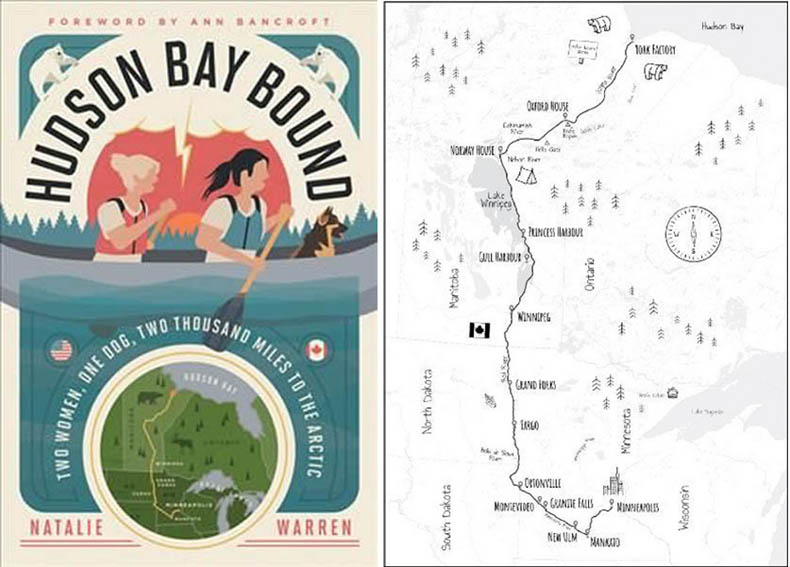|

Book Review
Hudson Bay Bound: Two Women, One Dog, Two Thousand Miles to the Arctic
By Natalie Warren Reviewed by Paul Caffyn
Published: 2021
Publisher: University of Minnesota Press
Contents: 226 pp, 1 map, central b/w photo section
Cover: Hardcover
ISBN: 978-1-5179-0784-6
Availability: Book Depository UK NZ$43.15
Back in June 1930, two young North American high school graduates set off in a second-hand 18-foot wood and canvas canoe to paddle from Minneapolis northwards to Hudson Bay in the Canadian Arctic. Eric Sevareid's book on the trip was first published in 1935, with a 75th anniversary edition printed in 2004. With bugger all prior paddling experience, it was quite an adventure for the two young blokes through Minnesota farmland, to the windswept granite islands of Lake Winnipeg and a mix of portages and downstream Arctic river paddling to Hudson Bay.
The first edition dust jacket noted: "Here is a fine out-door story which is exciting reading for all boys over ten — for girls too, and grown-ups who will want to pack a gunny sack and push off."
Then 76 years later, two young college graduates, Natalie Warren and Ann Raiho decide to tackle that same paddling journey. Author Warren, although raised in Florida, had a passion for rivers early in life and leaned on her mum to fly north one summer to attend an outdoor summer camp in Minnesota. There she was introduced to the magic of canoe camping which led to a love of wilderness paddling. Ann Raiho began paddling at this summer camp at the age of 12 and five years later, she and Natalie had formed a strong paddling team relationship.
Like Eric and Walter 76 years earlier, Natalie and Ann tried seeking sponsorship for a canoe and kit, and despite one really negative sexist response, they were given a 17 foot Kevlar Prospector canoe. Their planning and research was thorough, including seeking advice from Scott Miller who had paddled the route back in 2005.
The young women started paddling up-stream on June 2, 2011, heading slowly for the Canadian border, battling flood swollen rivers and portaging around dams that were not there back in 1930. The narrative of their remarkable 85-day paddle and portage is an engrossing read.
Apart from the fact that they were the first women to achieve the paddle, Natalie makes the comparisons between their trip and that of Eric and Walter all those years ago; how much farming and dam building has changed the character of the river they paddle, how farm run-off has mucked up their chances of directly drinking the river water until they reach the un-contaminated rivers of the high Canadian Arctic, and how so-called civilization has affected those living and surviving on the shores of the lakes and river banks.
As young women, the reaction from river and lake dwellers they meet, ranged from sexist control from old white boaties to positive support from the First Nation folk. With the pre-trip hype of polar bear attack in the lower reaches of the Hayes River and Hudson Bay, the women adopt a village stray — polar bear bait — who goes on to become an integral team member.
The book's Afterword is a retrospective view of their trip, rounding out the book nicely, of how the young women viewed the paddle, before, during and afterwards. The village stray goes on to have an adventure-packed dog life with Ann Raiho.
The central black and white photo plate section has 22 pics, which although printed on satin finish paper with a nice white border, should have been enlarged to bleed out to the page border. My pet hate is photos mired with vast expanses of white around them.
The single "sketchy" detail map shows the overall route paddled, with key place names. The book could have benefited with chapter section maps.
A tale well told of two young women setting out to follow the voyage of two young men some 76 years earlier. Although the women had maps with detail on all of the nasty rapids, it is still a seriously committing challenge, that is remarkable in terms of their mutual rapport for the paddle, with just the one hissy fit from Natalie whilst dealing with paddle delaying winds on Lake Winnipeg. A great story.

|
